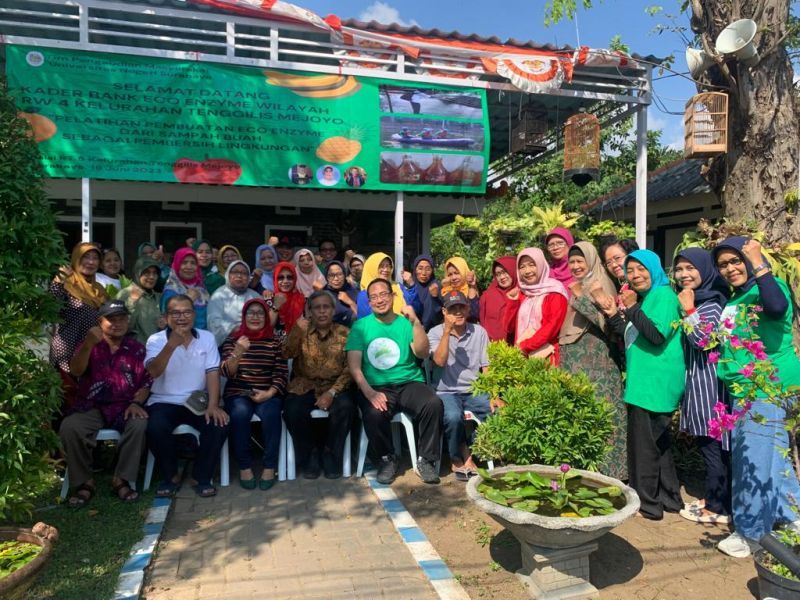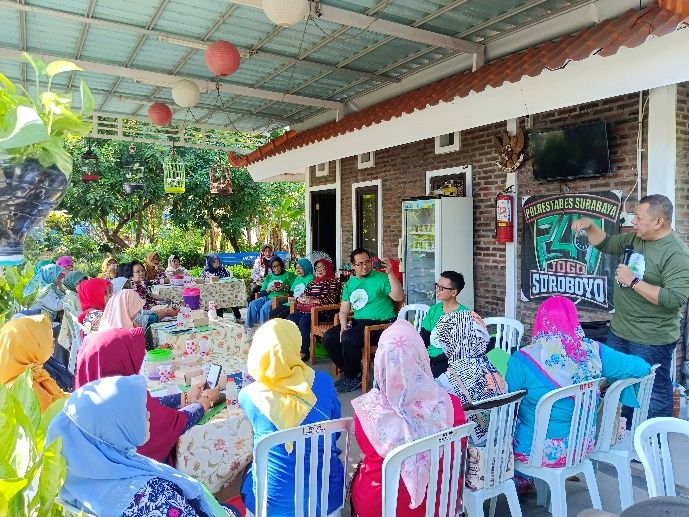Committed to Realizing Net Zero, Unesa Organizes Ecoenzym Festival and Campaigns for Zero Waste

Unesa.ac.id, SURABAYA-Waste is a serious problem in Indonesia. Based on data from the Ministry of Environment and Forestry (KLHK), in 2022, the total waste generated in Indonesia reached 69.2 million tons. UNESA lecturer and Vice Rector for Division III, Junaidi Budi Prihanto, Ph.D., revealed that only 35% of waste is managed properly, while the rest is still a challenge for all of us.
In order to overcome this problem, the UNESA community service team led by Junaidi Budi Prihanto with other lecturers; Prof. Nadi Suprapto, Ph.D., Dr. Sri Setyo Iriani, M.Si., Dr. Eko Hariyono, M.Pd., and Dra. Winarsih, M.Kes held a “Training on Making Eco-Enzyme from Fruit Waste as an Environmental Cleaner” for residents of RW IV, Tenggilis Mejoyo Village, Surabaya on Sunday (18/6/2023).
The training of making eco-enzyme which took place at the RT Hall 5 Tenggilis Utara Mejoyo Village was attended by 6 RT heads and 25 RW IV mothers. The UNESA team provided 33 gallons for making eco-enzyme during the training. The ingredients are leftover fruit, fruit peel, brown sugar, and clean water in a ratio of 3:1:10. The fermentation process in making eco-enzyme is done for 3 months.
“This training is part of the effort to realize an advanced, humanist and sustainable Surabaya City. Why eco-enzyme training? This is important for residents to have the ability to process sustainable waste. Some of it can be used to make environmentally friendly products made from a mixture of organic materials, such as fruits, vegetables, and sugar,” said Junaidi Budi Prihanto.
Dra. Winarsih M.Kes explained that the term “eco” refers to a friendly environment, while “enzyme” refers to a biocatalyst or substance that accelerates reactions. The eco-enzyme produced through this training can be used as an environmentally friendly natural cleaner, helping to reduce pollution, as well as negative impacts on the environment.

“Waste management plays an important role in efforts to protect the climate. The accumulation of waste that is not managed properly can cause greenhouse gas emissions and pollution, which have a negative impact on the global climate,” he said.
Meanwhile, Dr. Eko Hariyono, M.Pd. explained that it is important for all parties to start caring about the environment and the earth in general. All must take part to do small actions that can be used as examples for others or communities that have a big and positive impact on the environment.
Through this training, it is hoped that awareness and benefits about the importance of healthy and environmentally friendly living can be instilled in the residents of Tenggilis Village. The resulting Eco-enzyme can also replace harmful chemical cleaning products, reduce exposure to toxic substances, and reduce the carbon footprint generated by the production and use of conventional cleaning products.
In addition to training in making Eco-enzyme, in this activity a Zero waste campaign was also carried out to realize net zero emissions. Net zero emissions or zero carbon emissions itself is a condition where the amount of carbon emissions released into the atmosphere does not exceed the amount of emissions that can be absorbed by the earth. So that by promoting net zero emissions can participate in saving the earth for future sustainability.
Share It On: